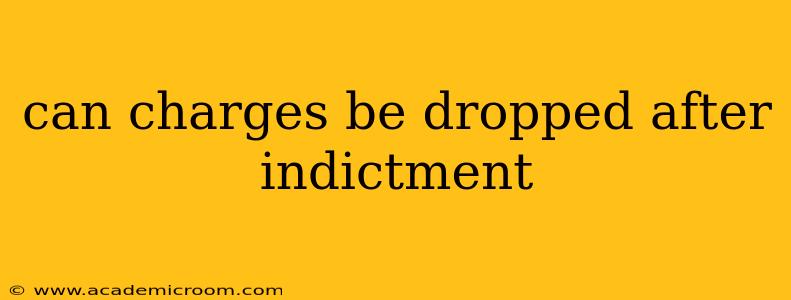The question of whether charges can be dropped after an indictment is complex, depending heavily on the specifics of the case and the jurisdiction. While it's less common than before an indictment, it's certainly possible. This article explores the circumstances under which charges might be dropped post-indictment and what that process entails.
What Happens After an Indictment?
An indictment is a formal accusation by a grand jury that there is enough evidence to proceed with a criminal trial. Once indicted, a defendant is formally charged with the crime(s) and the legal proceedings move forward. This typically involves arraignment (the defendant entering a plea), discovery (both sides exchanging evidence), and potentially plea bargaining negotiations.
Can Charges Be Dropped After an Indictment? Yes, but...
The short answer is yes, charges can be dropped after an indictment. However, it's a significant step requiring compelling reasons and often involves a legal battle. Here are some scenarios where this might occur:
1. Insufficient Evidence:
This is perhaps the most common reason. Even after indictment, the prosecution might discover new evidence that weakens their case or reveals significant flaws. This could include contradictory witness testimony, missing evidence, or exculpatory evidence (evidence that proves the defendant's innocence). If the prosecution believes they can no longer prove guilt beyond a reasonable doubt, they may move to dismiss the charges.
2. Witness Unreliability or Recantation:
Key witnesses may change their testimony, recant their statements, or become unavailable. This significantly impacts the prosecution's ability to present a solid case, potentially leading to the dismissal of charges.
3. Prosecutorial Misconduct:
If the prosecution engages in misconduct—such as withholding exculpatory evidence, coercing witnesses, or presenting false testimony—the judge may dismiss the charges to ensure a fair trial. This is a serious matter with significant implications.
4. Plea Bargain:
While not technically a "dropping" of charges, a plea bargain often leads to the dismissal of some or all charges in exchange for a guilty plea on lesser offenses. This is a common occurrence in criminal justice systems.
5. Legal Errors:
Procedural errors during the grand jury proceedings or other stages of the case could lead to the dismissal of charges. For example, a violation of the defendant's constitutional rights might warrant dismissal.
What Does the Process of Dropping Charges Entail?
The prosecution must formally request the dismissal of charges with the court. This often involves filing a motion to dismiss, which outlines the reasons for the request. The judge will review the motion and may hold a hearing before making a decision. The defense has the right to oppose the motion.
H2: What are the differences between dismissal and nolle prosequi?
A dismissal is the outright termination of the case. A nolle prosequi is a declaration by the prosecutor that they will not pursue the case at this time. While functionally similar, a nolle prosequi leaves open the possibility of the case being re-filed later.
H2: How long does it take for charges to be dropped after an indictment?
The timeframe varies significantly depending on the complexity of the case, the court’s backlog, and the specific reasons for the motion to dismiss. It could range from a few weeks to several months or even longer.
H2: Can charges be refiled after they've been dropped?
In many cases, yes. If charges are dismissed due to insufficient evidence at the time, the prosecution may refile the charges if new evidence emerges later. However, double jeopardy protections prevent the re-filing of charges after acquittal. The specifics will depend greatly on the exact reason for the dismissal and the jurisdiction.
Disclaimer: This information is for educational purposes only and should not be considered legal advice. If you are facing criminal charges, you should immediately consult with a qualified attorney.
